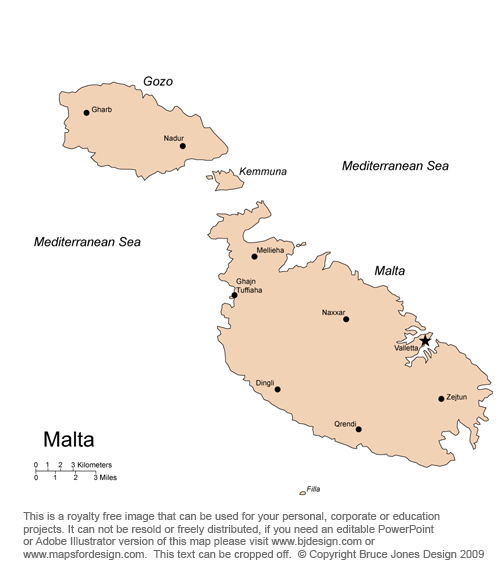 Malta
Malta
History
Malta is located in the Mediterranean Sea, just south of Sicily, and is made up of five, small islands; the largest of these islands is Malta. It was established as a Phoenician colony around 1,000 BC. Over the centuries, Greeks, Carthaginians, Romans, Arabs, Normans and French controlled the islands. The English Navy drove French forces out of Malta in 1814 and it became an official part of the British Empire. Malta was granted the right to form a constitution and was made an independent nation in September 1964. Malta has developed close political and economic ties to Libya, and visa requirements are nonexistent. Malta formally joined the European Union in 2004.
Church History
David Wulff, a Norwegian, was the first Pentecostal missionary to minister in Malta. Arriving in 1971, he immediately began working. By 1973, a Pentecostal assembly called Knisja Kristjana Evangelika (Christian Evangelical Church) was established. However, most of the Pentecostals in this church were non-Maltese and they eventually left for other countries. As a result, only six believers remained. Discouraged, they stopped meeting. In 1981, a missionary-evangelist named David Flanders arrived from England. He encouraged the Pentecostal nationals to begin meeting again. The Fellowship steadily grew and eventually joined the Assemblies of God.
The Movement Today
Ninety-eight percent of Malta claims to be Roman Catholic, and Pentecostal believers face much opposition. However, five Assemblies of God churches regularly meet in Malta. These congregations are actively involved in community evangelism. They distribute Christian literature and organize public outreaches and worship services. Global University has established a national office in Malta to disciple new converts and train national ministers and Christian workers. Global also works closely with the national church to distribute evangelism courses throughout the islands.
The Assemblies of God in Malta report the following statistics: three national ministers, one church and 200 members and adherents.
Additional Facts About Malta
- Capital: Valleta
- Area: 122 square miles
- Population: 447,000
- Urbanization: 95%
- Ethnic Groups: Maltese (descendants of Carthaginians and Phoenicians, with strong Italian and other Mediterranean stock)
- Languages: Maltese and English (both official)
- Agriculture: Potatoes, cauliflower, melons and tomatoes
- Industry: Tourism, electronics, construction, textiles and food products




